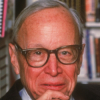Arthur M. Schlesinger, Jr.

Arthur M. Schlesinger, Jr.
Arthur Meier Schlesinger Jr.was an American historian, social critic, and public intellectual. The son of the influential historian Arthur M. Schlesinger Sr. and a specialist in American history, much of Schlesinger's work explored the history of 20th-century American liberalism. In particular, his work focused on leaders such as Harry S. Truman, Franklin D. Roosevelt, John F. Kennedy, and Robert F. Kennedy. In the 1952 and 1956 presidential campaigns, he was a primary speechwriter and adviser to the Democratic presidential nominee...
NationalityAmerican
ProfessionHistorian
Date of Birth15 October 1917
CountryUnited States of America
The passion for tidiness is the historian's occupational disease.
Santayana's aphorism must be reversed: too often it is those who can remember the past who are condemned to repeat it.
Politics in a democracy is, at the end, an educational process.
All wars are popular for the first 30 days.
To say that there is a case for heroes is not to say that there is a case for hero worship. The surrender of decision, the unquestioning submission to leadership, the prostration of the average man before the Great Man -- these are the diseases of heroism, and they are fatal to human dignity. History amply shows that it is possible to have heroes without turning them into gods. And history shows, too, that when a society, in flight from hero worship, decides to do without great men at all, it gets into troubles of its own.
The military struggle may frankly be regarded for what it actually was, namely a war for independence, an armed attempt to imposethe views of the revolutionists upon the British government and large sections of the colonial population at whatever cost to freedom of opinion or the sanctity of life and property.
People who claw their way to the top are not likely to find very much wrong with the system that enabled them to rise.
Every President reconstructs the Presidency to meet his own psychological needs.
I don't think I have made as much of my life as I should have. I should have written more books.
In Defense of the World Order . . . U.S. soldiers would have to kill and die.
History, in the end, becomes a form of irony.
Brave men earn the right to shape their own destiny.
Self-righteousness in retrospect is easy--also cheap,
The use of history as therapy means the corruption of history as history.